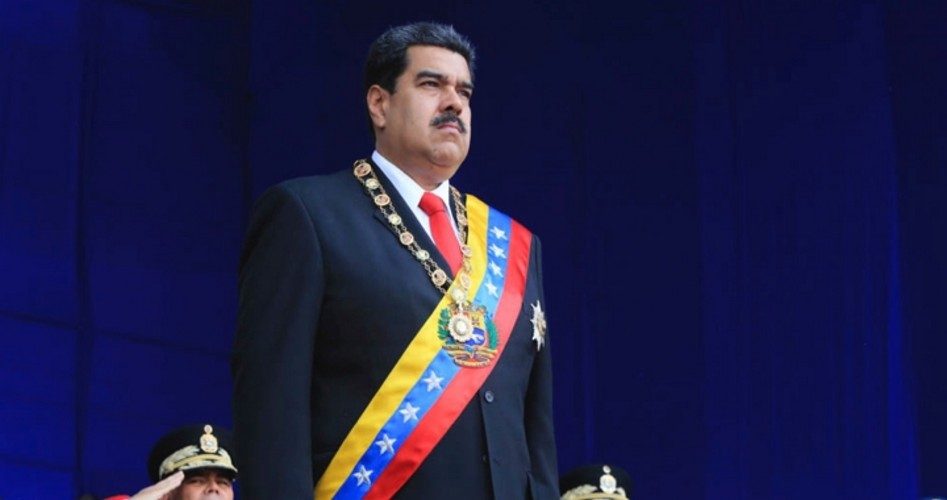
Venezuelan President Nicolás Maduro (shown), “desperately grasping at straws to try to fix the country’s economic meltdown,” announced a series of economic policy changes over the weekend that he hopes — almost certainly in vain — will save socialism from itself, reported Agence France-Presse.
In a speech to the nation late Friday, Maduro said the country must show “fiscal discipline” and stop inflating its currency, the bolivar, which has become practically worthless. That is, of course, very good advice; but Maduro is unlikely to follow it because doing so would require slashing the massive Venezuelan welfare state and liberalizing the economy, both of which are anathema to the committed Marxist. Instead, he is employing half-measures and tricks that “analysts say … could only serve to make matters worse,” wrote AFP.
Inflation is a huge problem in Venezuela. According to Bloomberg, “Prices are currently rising at an annualized rate of 108,000 percent,” causing thousands of Venezuelans to flee the country. Unfortunately, noted the news service, inflation “will get fresh fuel from [Maduro’s] measures.”
The government introduced Monday a new currency, the bolívar soberano (“sovereign bolivar”), to replace the old bolívar fuerte (“strong bolivar”). The new one is officially valued at 100,000 times the old one, which is to say the government lopped five zeros off the old bills. In 2008, Maduro’s predecessor and mentor, the late Hugo Chávez, tried the same thing, only with three zeros, to no avail.
The new currency will be pegged to Venezuela’s “widely discredited cryptocurrency,” the petro, noted AFP, explaining:
Cryptocurrency rating site ICOindex.com has branded the petro a “scam,” while the U.S. has banned its nationals from trading in it.
“Anchoring the bolivar to the petro is anchoring it to nothing,” said economist Luis Vicente Leon, director at polling organization Datanalisis.
Right from the outset, it has not been clear how the petro would operate, nor what being backed by oil actually means.
Nevertheless, Maduro is setting the petro up as the standard for Venezuela. Its value, currently set at $60 or 3,600 sovereign bolivars, but subject to change, will be used to set prices for goods in the country.
Meanwhile, Maduro “carried out one of the greatest currency devaluations in history over the weekend — a 95 percent plunge,” reported Bloomberg. The official exchange rate for the bolivar went from about 285,000 per dollar to six million. This move, while significant, is in large measure simply a recognition of reality: Six million-to-one is the going rate for bolivars on the black market, and many businesses already list their prices accordingly.
Maduro also tried to buy support from the populace by raising the monthly minimum wage to 1,800 sovereign bolivars, or about $28. That, observed AFP, “is still not enough to buy a kilo of meat.” However, considering that it is a 3,500-percent jump over the previous level, it, along with a four-percentage-point hike in the country’s value added tax, will greatly increase the cost of doing business in Venezuela, which will hardly help its embattled economy.
The uncertainty surrounding the sudden policy changes was such that many businesses did not open Monday. Banks were closed while trying to apply the new currency rules to their ATMs and other electronic services.
All these policy changes are driven by the government’s desire to raise desperately needed revenue. According to AFP, “The fiscal deficit is almost 20 percent of GDP while Venezuela struggles with an external debt of $150 billion.” Maduro has stopped payments on most foreign debt, and creditors are trying to seize Venezuela’s foreign assets in payment.
Last week, Maduro also announced that only those citizens registering their vehicles for a “fatherland card” would be allowed to continuing buying fuel at greatly subsidized prices. While ending the subsidies, which have cost Venezuela $10 billion since 2012, would be a good idea, Maduro’s opponents are right to fear that the move is less about saving money and more about controlling the populace.
Controlling the populace, however, is Maduro’s modus operandi, as it is for all socialists. But unless Maduro becomes willing to cede this control, he may well end up presiding over a barren, depopulated wasteland — situated, ironically, on the world’s largest proven oil reserves.
Photo: AP Images



